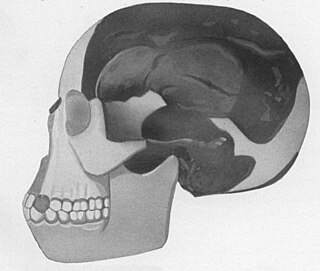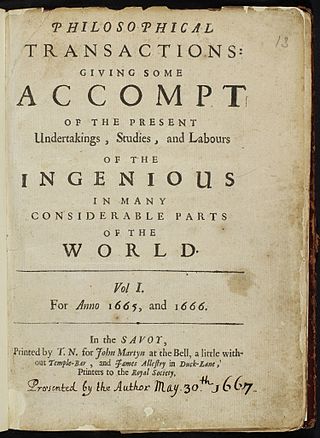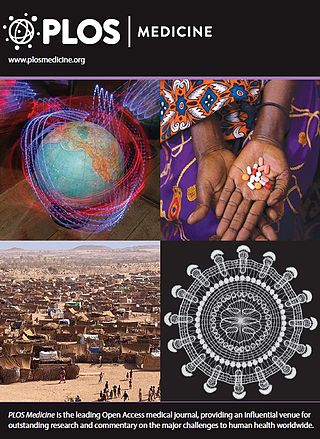Related Research Articles

Scientific misconduct is the violation of the standard codes of scholarly conduct and ethical behavior in the publication of professional scientific research. It is violation of scientific integrity: violation of the scientific method and of research ethics in science, including in the design, conduct, and reporting of research.

A ghostwriter is a person hired to write literary or journalistic works, speeches, or other texts that are putatively credited to another person as the author. Celebrities, executives, participants in timely news stories, and political leaders often hire ghostwriters to draft or edit autobiographies, memoirs, magazine articles, or other written material.

Scientific literature encompasses a vast body of academic papers that spans various disciplines within the natural and social sciences. It primarily consists of academic papers that present original empirical research and theoretical contributions. These papers serve as essential sources of knowledge and are commonly referred to simply as "the literature" within specific research fields.
In scientific writing, IMRAD or IMRaD is a common organizational structure. IMRaD is the most prominent norm for the structure of a scientific journal article of the original research type.

David HealyFRCPsych, a professor of psychiatry at Bangor University in the United Kingdom, is a psychiatrist, psychopharmacologist, scientist and author. His main areas of research are the contribution of antidepressants to suicide, conflict of interest between pharmaceutical companies and academic medicine, and the history of pharmacology. Healy has written more than 150 peer-reviewed articles, 200 other articles, and 20 books, including The Antidepressant Era, The Creation of Psychopharmacology, The Psychopharmacologists Volumes 1–3, Let Them Eat Prozac and Mania: A Short History of Bipolar Disorder.

Medical research, also known as health research, refers to the process of using scientific methods with the aim to produce knowledge about human diseases, the prevention and treatment of illness, and the promotion of health.

PLOS Medicine is a peer-reviewed weekly medical journal covering the full spectrum of the medical sciences. It began operation on October 19, 2004, as the second journal of the Public Library of Science (PLOS), a non-profit open access publisher. All content in PLOS Medicine is published under the Creative Commons "by-attribution" license. To fund the journal, the publication's business model requires in most cases that authors pay publication fees. The journal was published online and in a printed format until 2005 and is now only published online. The journal's acting chief editor is Clare Stone, who replaced the previous chief editor, Larry Peiperl, in 2018.
The American Medical Writers Association (AMWA) is a professional association for medical communicators, with more than 4,000 members in the United States, Canada, and 30 other countries. AMWA is governed by a board of directors composed of the elected officers, 6–8 at-large directors, and the chapter advisory council chair. AMWA has regional chapters and provides local networking opportunities throughout the United States and Canada. The association was founded in 1940 by physicians interested in improving the quality of medical writing and editing.
Scientific writing is about science, with the implication that the writing is done by scientists and for an audience that primarily includes peers—those with sufficient expertise to follow in detail. Scientific writing is a specialized form of technical writing, and a prominent genre of it involves reporting about scientific studies such as in articles for a scientific journal. Other scientific writing genres include writing literature-review articles, which summarize the existing state of a given aspect of a scientific field, and writing grant proposals, which are a common means of obtaining funding to support scientific research. Scientific writing is more likely to focus on the pure sciences compared to other aspects of technical communication that are more applied, although there is overlap. There is not one specific style for citations and references in scientific writing. Whether you are submitting a grant proposal, literature review articles, or submitting an article into a paper, the citation system that must be used will depend on the publication you plan to submit to.

The ICMJE recommendations are a set of guidelines produced by the International Committee of Medical Journal Editors for standardising the ethics, preparation and formatting of manuscripts submitted to biomedical journals for publication. Compliance with the ICMJE recommendations is required by most leading biomedical journals. Levels of real compliance are subject to debate. As of 9 January 2020, 5570 journals worldwide claim to follow the ICMJE recommendations.
The Vancouver system, also known as Vancouver reference style or the author–number system, is a citation style that uses numbers within the text that refer to numbered entries in the reference list. It is popular in the physical sciences and is one of two referencing systems normally used in medicine, the other being the author–date, or "Harvard", system. Vancouver style is used by MEDLINE and PubMed.
Pharmaceutical publication planning is the activity of planning the dissemination of scientific and clinical data on a drug to healthcare professionals at scientific congresses and medical society meetings and in peer reviewed medical journals.
Academic authorship of journal articles, books, and other original works is a means by which academics communicate the results of their scholarly work, establish priority for their discoveries, and build their reputation among their peers. Through authorship, researchers, assistants, interns, students, and other involved parties receive credit for their contributions and can be held responsible and accountable for the quality and integrity of the work.
The Drug Industry Documents Archive (DIDA) is a digital archive of pharmaceutical industry documents created and maintained by the University of California, San Francisco, Library and Center for Knowledge Management. DIDA is a part of the larger UCSF Industry Documents Library which includes the Truth Tobacco Industry Documents. The archive contains documents about pharmaceutical industry clinical trials, publication of study results, pricing, marketing, relations with physicians and drug company involvement in continuing medical education.
The Grey Literature International Steering Committee (GLISC) was established in 2006 after the 7th International Conference on Grey Literature (GL7) held in Nancy (France) on 5–6 December 2005.
EASE Guidelines for Authors and Translators of Scientific Articles to be Published in English were first published by the European Association of Science Editors (EASE) in 2010. Updated versions are periodically released at the EASE Guidelines page of the EASE website. EASE Guidelines summarize the most important editorial recommendations, aiming to make international scientific communication more efficient and to aid in preventing scientific misconduct. They also support the global initiative Healthcare Information For All by 2015 by advising authors to make abstracts of their papers highly informative, reliable, and easily understandable. The document has been translated into many languages to facilitate its popularization worldwide and help scientists from non-Anglophone countries.

Wyeth Pharmaceuticals Inc. was a pharmaceutical company until it was purchased by Pfizer in 2009. The company was founded in Philadelphia, Pennsylvania, in 1860 as John Wyeth and Brother. Its headquarters moved to Collegeville, Pennsylvania, and Madison, New Jersey, before its headquarters were consolidated with Pfizer's in New York City after the 2009 merger.
In medicine, a clinical study report (CSR) on a clinical trial is a document, typically very long, providing much detail about the methods and results of a trial. A CSR is a scientific document addressing efficacy and safety, not a sales or marketing tool; its content is similar to that of a peer-reviewed academic paper. Results of trials are usually reported in a briefer academic journal paper, but methodological flaws are often glossed over in the briefer paper.

Conflicts of interest (COIs) often arise in academic publishing. Such conflicts may cause wrongdoing and make it more likely. Ethical standards in academic publishing exist to avoid and deal with conflicts of interest, and the field continues to develop new standards. Standards vary between journals and are unevenly applied. According to the International Committee of Medical Journal Editors, "[a]uthors have a responsibility to evaluate the integrity, history, practices and reputation of the journals to which they submit manuscripts".
In research, a paper mill is a business that publishes poor or fake journal papers that seem to resemble genuine research, as well as sells authorship.
References
- 1 2 3 Sismondo, Sergio (September 2007). "Ghost management: how much of the medical literature is shaped behind the scenes by the pharmaceutical industry?". PLOS Medicine. 4 (9): e286. doi: 10.1371/journal.pmed.0040286 . ISSN 1549-1676. PMC 1989751 . PMID 17896859.
- ↑ "AMWA Ethics FAQ". amwa.org. Archived from the original on 2013-07-16.
- ↑ "Recommendations — Defining the Role of Authors and Contributors". ICMJE.org.
- ↑ "Recommendations". ICMJE.org.
- ↑ "Journals Following the ICMJE Recommendations". ICMJE.org.
- ↑ "Uniform Requirements for Manuscripts Submitted to Biomedical Journals: Publishing and Editorial Issues Related to Publication in Biomedical Journals: Corrections, Retractions and "Expressions of Concern"". ICMJE.org. International Committee of Medical Journal Editors. Archived from the original on 2013-03-30. Retrieved 2013-03-19.
- ↑ "Guidelines". publicationethics.org.
- ↑ Wager, Liz (2012). "What to do if you suspect redundant (duplicate) publication" (PDF). publicationethics.org. http://publicationethics.org/files/All%20Flowcharts%20English%2017%20July%202012.pdf
- ↑ Fletcher, Robert (June 2005). "Ghost writing initiated by commercial companies". Journal of General Internal Medicine. 20 (6): 549. doi:10.1111/j.1525-1497.2005.41015.x. ISSN 1525-1497. PMC 1490135 . PMID 15987333.
- ↑ Rennie, D.; Flanagin, A. (1994). "Authorship! Authorship! Guests, ghosts, grafters, and the two-sided coin". JAMA . 271 (6): 469–471. doi:10.1001/jama.1994.03510300075043. PMID 8295324.
- ↑ Studdert; et al. (2004). "Financial Conflicts of Interest in Physicians' Relationships with the Pharmaceutical Industry—Self-Regulation in the Shadow of Federal Prosecution". NEJM . 351 (18): 1891–1900. doi:10.1056/NEJMlim042229. PMID 15509824.
- ↑ Mathews, Anna Wilde (December 13, 2005). "At medical journals, paid writers play big role". Wall Street Journal .
- ↑ Ross, Elliot (20 May 2000). "How drug companies' PR tactics skew the presentation of medical research". The Guardian .
- ↑ The influence of the pharmaceutical industry (PDF) (Report). London: House of Commons Health Committee, The Stationery Office Limited. 2005.
- 1 2 3 "Frequently Asked Questions about Medical Ghostwriting". Project On Government Oversight . June 28, 2011.
- ↑ Project On Government Oversight, "Frequently Asked Questions about Medical Ghostwriting", June 28, 2011
- ↑ Boseley, Sarah (February 7, 2002). "Scandal of scientists who take money for papers ghostwritten by drug companies". The Guardian . p. 4.
- ↑ Giombetti (1992). "UW's Friendly Corporate Ghostwriter". Eat the State. 6 (19).[ page needed ]
- ↑ Krimsky, Sheldon (2003). Science in the Private Interest: Has the Lure of Profits Corrupted Biomedical Research? . Lanham: Rowman-Littlefield. ISBN 0-7425-1479-X.
- ↑ Thacker, Paul (Jun 22, 2011). "How Scientific Literature Has Become Part of Big Pharma's Marketing Machine and How Being Nice Hurts Canada: 5 Questions with Ghostwriting Expert Trudo Lemmens". Project On Government Oversight .
- ↑ Leo, J.; Lacasse, J.R. (2011). "Why Does Academic Medicine Allow Ghostwriting: A Prescription for Reform". Society. 48 (5): 371–375. doi:10.1007/s12115-011-9455-2.
- ↑ Wilson, Duff; Singer, Natasha (September 11, 2009). "Ghostwriting Is Called Rife in Medical Journals". The New York Times. Retrieved May 12, 2010.
- ↑ Singer, Natasha (August 5, 2009). "Ghostwriters Paid by Wyeth Aided Its Drugs - NYTimes.com". The New York Times. Retrieved May 12, 2010.
- ↑ Jacobs, A.; Hamilton, A. (2009). "Decreased evidence of ghostwriting in a 2008 vs 2005 survey of medical writers" (PDF). The Write Stuff. 18 (2): 118–123. Archived from the original (PDF) on 2011-07-16. Retrieved 2010-02-23.
- ↑ "Ghostwriter werden → jetzt bewerben" (in German). Business and Science. 14 November 2020.
- ↑ Grassley, Charles, ed. (June 24, 2010). "Ghostwriting in Medical Literature" (PDF). Minority Staff Report,111th Congress, United States Senate Committee on Finance (Report). Washington, DC. Retrieved 2010-07-11.[ permanent dead link ]